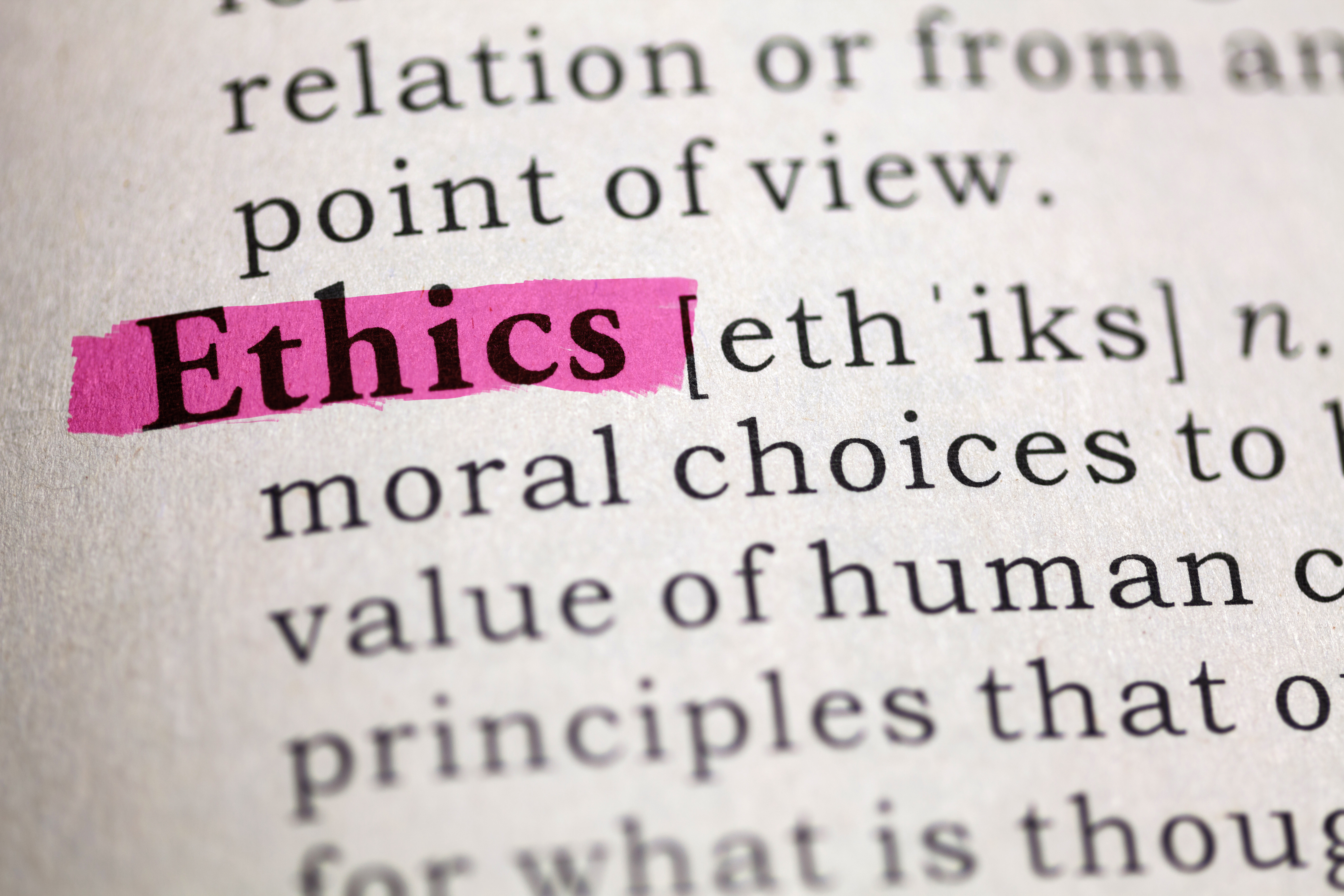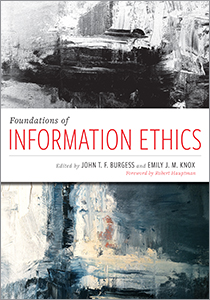"The world needs more people who speak the language of information ethics": editors John T. F. Burgess and Emily J. M. Knox discuss their new text
In his foreword to Foundations of Information Ethics, Robert Hauptman sums it up best: "An ethical attitude to the production, dissemination, storage, access, and retrieval of information and data is beneficial and necessary to a well-functioning information society; this is affirmed by crisis after crisis concerning false news, fake facts, social media privacy invasions, and everything else." John T. F. Burgess and Emily J. M. Knox set out to craft a primer that would be as useful for working professionals as information studies students, and their new book offers a wide sweep of important issues such as privacy, censorship, and digital citizenship. Here they talk about their collaboration, their book's utility as a teaching text, and the professional confidence one can cultivate by being familiar with information ethics.
Congrats on the book! There really does not seem to be any other text quite like this in the current literature. What was the genesis of the book and how did it all come together?
Thank you! The book came together as a result of work that we did together as co-conveners of an information ethics special interest group, and from conversations we had with other ethics researchers. If you are someone who keeps up with the news today, you’re likely to walk away with the same feeling that we have, that the world needs more people who speak the language of information ethics, particularly people who are already deeply invested in providing access to information and creative media. One barrier to being able to apply information ethics research to professional practice is  the perception that information ethics is a complex discipline. Someone might be worried that they need a philosophy degree or a background in the law to discuss ethics, for example. Our goal was to create a book that would cover everything the reader needs to know about the current state of the literature in key information ethics topics, while presenting the content in a way that would empower them to ask questions in the ways that ethicists do.
the perception that information ethics is a complex discipline. Someone might be worried that they need a philosophy degree or a background in the law to discuss ethics, for example. Our goal was to create a book that would cover everything the reader needs to know about the current state of the literature in key information ethics topics, while presenting the content in a way that would empower them to ask questions in the ways that ethicists do.
What were the biggest challenges and surprises as your collaboration unfolded?
The main challenge is that information ethics is a relatively young discipline, so its boundaries are still being set. As a consequence, we wanted to ensure that this book accurately reflected current trends in information ethics research but did so in a way that was balanced with readers’ prior knowledge of professional codes of ethics. There is also the issue of how to represent conflicting arguments about contentious subjects like intellectual property, digital citizenship, and cognitive justice. It was important to not artificially smooth the conflicts, and instead help the reader encounter live and important questions ethicists are still working to resolve. The main surprise was a pleasant one, that so many respected voices in information ethics research were willing to devote their time to this project. We feel fortunate to be able to share such a strong lineup of contributors with our readers.
The scope of your book is also unique, covering everything from human rights to cybersecurity. And yet as a whole it’s a very concise text. What criteria did you use to decide which aspects of information ethics were the most crucial, and how did you make sure not to leave something out?
Information ethics is an international discipline, so it was important to us that we worked with voices outside of the U.S. and that we included perspectives from non-European ethical traditions. As we considered the topics to cover in this book, we let the conversations that were occurring in the literature be our guides. This is a side effect of this discipline’s relationship with information systems and information technologies, as new technology innovations occur, new challenges to commonly held ethical norms and principles arise. Even traditional topics such as privacy and access were presented in ways to capture current thinking and using contemporary cases as examples of what directions the conversations were taking.
As instructors yourselves, you must have put a lot of thought into how this book would be used as a teaching text. Would you talk a little about its 12-chapter structure?
It was important to us that this be a concise text. The scope of the material is designed to act as a centerpiece for conversations with primary philosophical sources and applied cases, rather than as a solitary resource. This approach makes it easy for each instructor to customize their session content, either by adding selections from the recommended readings, or material from their own emphasis. Most universities teach in sixteen-week semesters so having twelve chapters allows for flexibility with topics. While we believe these topics to be the essential ones, professors can add other topics  that are relevant for the particular course they are teaching. In general, the first three chapters of the book are designed to give readers the language they need to read information ethics arguments in context, and of course the final one presents a roundup of topics where research is most active. The other chapters are self-contained and may be presented in the order that best meets the instructor’s pedagogical goals.
that are relevant for the particular course they are teaching. In general, the first three chapters of the book are designed to give readers the language they need to read information ethics arguments in context, and of course the final one presents a roundup of topics where research is most active. The other chapters are self-contained and may be presented in the order that best meets the instructor’s pedagogical goals.
The final chapter on emerging issues is especially important. In your view, what will be the most urgent issues for tomorrow’s LIS grads?
We would like to stress the importance of helping LIS grads be able to articulate the relationship between what they do and why they do without having to appeal to a professional code of ethics, since those codes have little power outside of those who willingly adopt them. Instead, if they can argue why their position is right, they will have the powers of authentic speech and clear action, which are useful when conundrums arise, whatever form they may take.
Librarians, archivists, and other information professionals will continue to grow more service focused instead of collection focused. This will drive LIS professionals to expand their concerns into ever widening civic and entrepreneurial spaces. Serving people well means understanding the implications of technological innovation and having the courage to speak up when patron interests are at risk of being exploited. These are not easy decisions to make, but we hope that LIS grads trained in information ethics will be better prepared to lead in these new spaces.
Learn more at the ALA Store.
